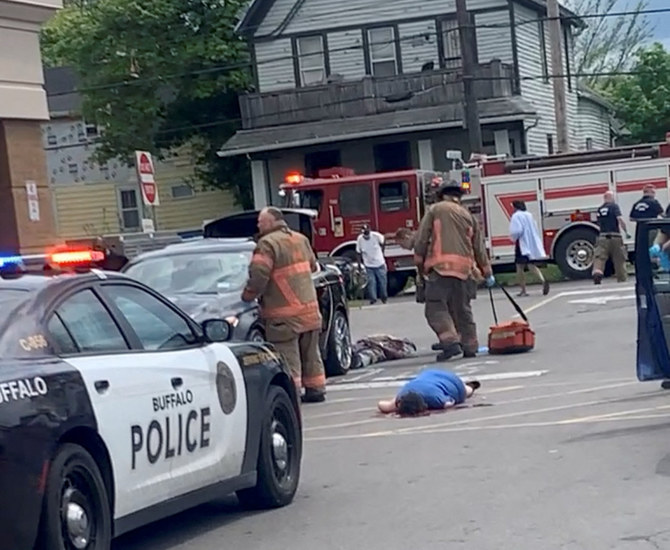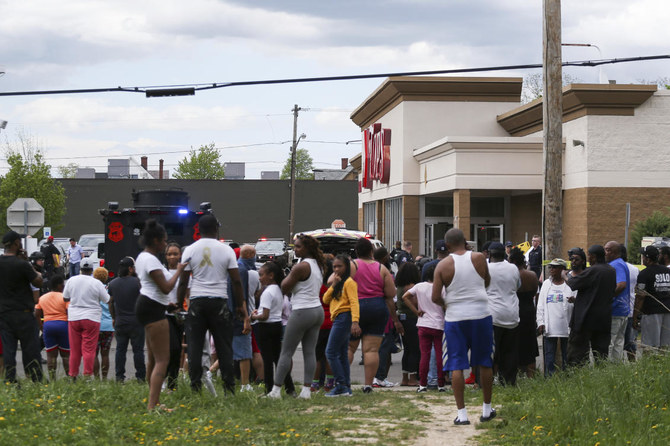BUFFALO, New York: A white 18-year-old wearing military gear and livestreaming with a helmet camera opened fire with a rifle at a supermarket in Buffalo, killing 10 people and wounding three others Saturday in what authorities described as “racially motived violent extremism.”
The gunman wore body armor and military-style clothing during the attack on mostly Black shoppers and workers at Tops Friendly Market. For at least two minutes, he broadcast the shooting live on the streaming platform Twitch before the service ended his transmission.
Police said he shot 11 Black victims and two who were white before surrendering to police. Later, he appeared before a judge in a paper medical gown and was arraigned on murder charges.
“It is my sincere hope that this individual, this white supremacist who just perpetrated a hate crime on an innocent community, will spend the rest of his days behind bars. And heaven help him in the next world as well,” said Gov. Kathy Hochul, speaking near the scene of the attack.
The suspected gunman was identified as Payton Gendron, of Conklin, New York, about 200 miles (320 kilometers) southeast of Buffalo.
It wasn’t immediately clear why Gendron traveled to Buffalo to stage the assault. A clip apparently from his Twitch feed, posted on social media, showed him arriving at the supermarket in his car.
The gunman shot four people outside the store, three fatally, said Buffalo Police Commissioner Joseph Gramaglia. Inside the store, a security guard who was a retired Buffalo police officer fired multiple shots, but a bullet that hit the gunman’s bulletproof vest had no effect, Gramaglia added.
The gunman then killed the guard, the commissioner said, then stalked through the store shooting other victims.
“This is the worst nightmare that any community can face, and we are hurting and we are seething right now,” Buffalo Mayor Byron Brown said at the news conference. “The depth of pain that families are feeling and that all of us are feeling right now cannot even be explained.”
Police entered the store and confronted the gunman in the vestibule.
“At that point the suspect put the gun to his own neck,” Gramaglia said. Two officers talked him into dropping the gun, the commissioner said.
At the earlier news briefing, Erie County Sheriff John Garcia pointedly called the shooting a hate crime.
“This was pure evil. It was straight up racially motivated hate crime from somebody outside of our community, outside of the City of Good neighbors ... coming into our community and trying to inflict that evil upon us,” Garcia said.
Witnesses Braedyn Kephart and Shane Hill, both 20, pulled into the parking lot just as the shooter was exiting. They described a white male in his late teens or early twenties sporting full camo, a black helmet and what appeared to be a rifle.
“He was standing there with the gun to his chin. We were like what the heck is going on? Why does this kid have a gun to his face?” Kephart said. He dropped to his knees. “He ripped off his helmet, dropped his gun, and was tackled by the police.”
Tops Friendly Markets released a statement saying, “We are shocked and deeply saddened by this senseless act of violence and our thoughts and prayers are with the victims and their families.”
The shooting came little more than a year after a March 2021 attack at a King Soopers grocery in Boulder, Colorado, that killed 10 people. Investigators have not released any information about why they believe the man charged in that attack targeted the supermarket.
NAACP President Derrick Johnson issued a statement in which he called the Buffalo shooting “absolutely devastating.”
“Our hearts are with the community and all who have been impacted by this terrible tragedy. Hate and racism have no place in America. We are shattered, extremely angered and praying for the victims’ families and loved ones,” he added.
The Rev. Al Sharpton called on the White House to convene a meeting with Black, Jewish and Asian leaders “to underscore the Federal government (is) escalating its efforts against hate crimes.”
At the White House, Press Secretary Karine Jean-Pierre said President Joe Biden was receiving regular updates on the shooting and the investigation and had offered prayers with the first lady for the victims and their loved ones.
“The president has been briefed by his Homeland Security adviser on the horrific shooting in Buffalo, N.Y., this afternoon. He will continue to receive updates throughout the evening and tomorrow as further information develops,” she said.
Attorney General Merrick Garland was briefed on the shooting, Justice Department spokesperson Anthony Coley said.
More than two hours after the shooting, Erica Pugh-Mathews was waiting outside the store, behind police tape.
“We would like to know the status of my aunt, my mother’s sister. She was in there with her fiancé, they separated and went to different aisles,” she said. “A bullet barely missed him. He was able to hide in a freezer but he was not able to get to my aunt and does not know where she is. We just would like word either way if she’s OK.”























